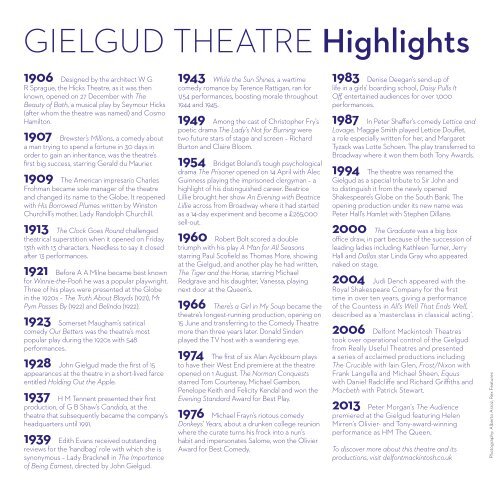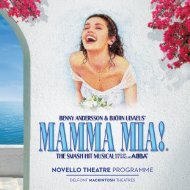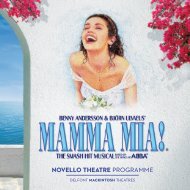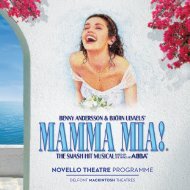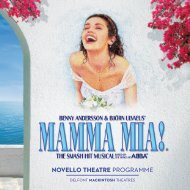DMT Editorial 2017_04_JUN_JUL_Proof15
You also want an ePaper? Increase the reach of your titles
YUMPU automatically turns print PDFs into web optimized ePapers that Google loves.
GIELGUD THEATRE Highlights<br />
1906 Designed by the architect W G<br />
R Sprague, the Hicks Theatre, as it was then<br />
known, opened on 27 December with The<br />
Beauty of Bath, a musical play by Seymour Hicks<br />
(after whom the theatre was named) and Cosmo<br />
Hamilton.<br />
1907 Brewster’s Millions, a comedy about<br />
a man trying to spend a fortune in 30 days in<br />
order to gain an inheritance, was the theatre’s<br />
first big success, starring Gerald du Maurier.<br />
1909 The American impresario Charles<br />
Frohman became sole manager of the theatre<br />
and changed its name to the Globe. It reopened<br />
with His Borrowed Plumes written by Winston<br />
Churchill’s mother, Lady Randolph Churchill.<br />
1913 The Clock Goes Round challenged<br />
theatrical superstition when it opened on Friday<br />
13th with 13 characters. Needless to say it closed<br />
after 13 performances.<br />
1921 Before A A Milne became best known<br />
for Winnie-the-Pooh he was a popular playwright.<br />
Three of his plays were presented at the Globe<br />
in the 1920s – The Truth About Blayds (1921), Mr<br />
Pym Passes By (1922) and Belinda (1922).<br />
1923 Somerset Maugham’s satirical<br />
comedy Our Betters was the theatre’s most<br />
popular play during the 1920s with 548<br />
performances.<br />
1928 John Gielgud made the first of 15<br />
appearances at the theatre in a short-lived farce<br />
entitled Holding Out the Apple.<br />
1937 H M Tennent presented their first<br />
production, of G B Shaw’s Candida, at the<br />
theatre that subsequently became the company’s<br />
headquarters until 1991.<br />
1939 Edith Evans received outstanding<br />
reviews for the ‘handbag’ role with which she is<br />
synonymous – Lady Bracknell in The Importance<br />
of Being Earnest, directed by John Gielgud.<br />
1943 While the Sun Shines, a wartime<br />
comedy romance by Terence Rattigan, ran for<br />
1,154 performances, boosting morale throughout<br />
1944 and 1945.<br />
1949 Among the cast of Christopher Fry’s<br />
poetic drama The Lady’s Not for Burning were<br />
two future stars of stage and screen – Richard<br />
Burton and Claire Bloom.<br />
1954 Bridget Boland’s tough psychological<br />
drama The Prisoner opened on 14 April with Alec<br />
Guinness playing the imprisoned clergyman – a<br />
highlight of his distinguished career. Beatrice<br />
Lillie brought her show An Evening with Beatrice<br />
Lillie across from Broadway where it had started<br />
as a 14-day experiment and become a £265,000<br />
sell-out.<br />
1960 Robert Bolt scored a double<br />
triumph with his play A Man for All Seasons<br />
starring Paul Scofield as Thomas More, showing<br />
at the Gielgud, and another play he had written,<br />
The Tiger and the Horse, starring Michael<br />
Redgrave and his daughter, Vanessa, playing<br />
next door at the Queen’s.<br />
1966 There’s a Girl in My Soup became the<br />
theatre’s longest-running production, opening on<br />
15 June and transferring to the Comedy Theatre<br />
more than three years later. Donald Sinden<br />
played the TV host with a wandering eye.<br />
1974 The first of six Alan Ayckbourn plays<br />
to have their West End premiere at the theatre<br />
opened on 1 August. The Norman Conquests<br />
starred Tom Courtenay, Michael Gambon,<br />
Penelope Keith and Felicity Kendal and won the<br />
Evening Standard Award for Best Play.<br />
1976 Michael Frayn’s riotous comedy<br />
Donkeys’ Years, about a drunken college reunion<br />
where the curate turns his frock into a nun’s<br />
habit and impersonates Salome, won the Olivier<br />
Award for Best Comedy.<br />
1983 Denise Deegan’s send-up of<br />
life in a girls’ boarding school, Daisy Pulls It<br />
Off, entertained audiences for over 1,000<br />
performances.<br />
1987 In Peter Shaffer’s comedy Lettice and<br />
Lovage, Maggie Smith played Lettice Douffet,<br />
a role especially written for her, and Margaret<br />
Tyzack was Lotte Schoen. The play transferred to<br />
Broadway where it won them both Tony Awards.<br />
1994 The theatre was renamed the<br />
Gielgud as a special tribute to Sir John and<br />
to distinguish it from the newly opened<br />
Shakespeare’s Globe on the South Bank. The<br />
opening production under its new name was<br />
Peter Hall’s Hamlet with Stephen Dillane.<br />
2000 The Graduate was a big box<br />
office draw, in part because of the succession of<br />
leading ladies including Kathleen Turner, Jerry<br />
Hall and Dallas star Linda Gray who appeared<br />
naked on stage.<br />
20<strong>04</strong> Judi Dench appeared with the<br />
Royal Shakespeare Company for the first<br />
time in over ten years, giving a performance<br />
of the Countess in All’s Well That Ends Well,<br />
described as a ‘masterclass in classical acting’.<br />
2006 Delfont Mackintosh Theatres<br />
took over operational control of the Gielgud<br />
from Really Useful Theatres and presented<br />
a series of acclaimed productions including<br />
The Crucible with Iain Glen, Frost/Nixon with<br />
Frank Langella and Michael Sheen, Equus<br />
with Daniel Radcliffe and Richard Griffiths and<br />
Macbeth with Patrick Stewart.<br />
2013 Peter Morgan’s The Audience<br />
premiered at the Gielgud featuring Helen<br />
Mirren’s Olivier- and Tony-award-winning<br />
performance as HM The Queen.<br />
To discover more about this theatre and its<br />
productions, visit delfontmackintosh.co.uk<br />
Photography: Alberto Arzoz, Rex Features


